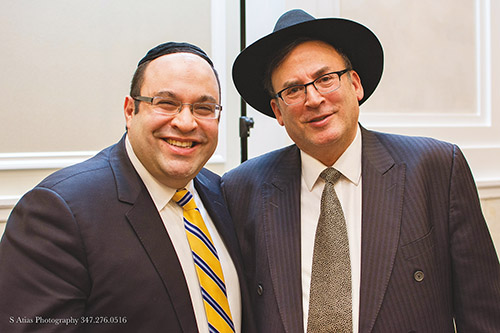
It is hard to believe that it has been a year since the passing of my rebbe, Rabbi Wallerstein. So much has been written and said about his middos tovos and genuine concern for klal Yisroel. During his life, he has always taught us everlasting lessons in perseverance and fortitude. He was a very big proponent of not victimizing yourself, and instead, focusing on whatever you went through and using that pain to catapult yourself into being a success. His lessons were constantly about using whatever you went through to push yourself forward to become better, and to make the world better. Rabbi Wallerstein exemplified this message, via his own pain and difficulties in life, which translated into life lessons for his students. He spoke about a person’s unique ability to overcome challenges through using their “struggle muscle.”
During one of his shiurim, the rebbe mentioned how he had researched various precious metals, coming to the conclusion that gold, silver and copper come from the ground, but yet, a pearl comes from an oyster. Hakadosh Baruch Hu, in his infinite kindness created millions of plankton in the ocean. All the oyster has to do is open his mouth, and it receives a constant food source. However, there are times that a grain of sand may become lodged inside the oyster. This creates pain and unease. Once again, Hashem, in His chesed, allows the oyster to secrete a liquid and coat the sand with layers of fluid called aragonite and conchiolin. Once it does this, eventually, the oyster can produce a pearl. The rebbe explained that through the struggle that the oyster has to go through with this kernel of sand, it creates something wonderful and brilliant. So too, in our lives, when we go through challenges, we can also forge through and shine bright.
At his hesped, a good friend of mine, Jeff Stern Esq., who is also a talmid of Rabbi Wallerstein mentioned that the rebbe believed in not being a dreamer, but a doer. Many people talk about doing things, but don’t actually do them. He would say how a person has to act like Nachshon Ben Aminadav and jump in, even though he may not know how the outcome may be, and yet, a person should realize that when you are doing the right thing, Hashem will take over and make the sea split.
Coming off the recent Yom Tov of Pesach, Rabbi Wallerstein would often cite parables about how Hakadosh Baruch Hu is the Prince, and we, klal Yisroel, are His princesses. During one such story, he mentioned how there was a prince journeying to another country to meet his future wife, the future princess. Along the journey, the prince suddenly asked his wagon driver to stop. Along the side of the road, he had seen a ragged, dirty figure waving her hand. He asked her why she was so bedraggled and walking on the side of the road. She explained that she was collecting alms for the poor, which she did every day. The prince, in his benevolence, decided to tell his entourage to allow her to come with him and return to the palace. When the prince’s entourage heard this, they vehemently opposed the decision and reminded the prince that he was on the way to another country to meet his future wife. Nevertheless, the prince said that he would actually want to marry this woman and even allowed her passage back to the palace. At the palace, everyone was in shock and bewilderment as to why the prince would bring this wretched specimen back to the palace. He ordered his attendants to wash and dress the woman as befitting a royal, to make her appearance presentable for dinner that night. As she entered the dining room, the entire palace was in awe. Surely this was not the person that the prince found on the side of the road earlier that day.
As this woman lived in the forest, though she looked presentable, she did not have the proper dining etiquette as befitting a princess. Once again, the prince ordered his attendants to teach her the proper way to act as a royal. After a while, this future princess learned all the mannerisms and customs as befitting a future queen. Having come from such a meager and humble background, not only was she a kind princess, she went out of her way to help the poor and downtrodden.
This mashal exemplifies the story of klal Yisroel, who were “downtrodden” and “dirty” during their years in Mitzrayim. It was through the benevolent love of Hakadosh Baruch Hu, that He decided to make us his very own “princess.” Though it took time, we eventually became a most deserving nation of klal Yisroel.
The messages of perseverance, persistence and understanding that Hashem has always and will always love us no matter what we go through, were a bedrock of chizuk and encouragement to all who had the fortune of knowing Rabbi Wallerstein.
May his neshama have an aliyah, and may he continue to storm the Kisei Hakavod in search of continued rachamim for klal Yisroel.
By Chaim Bruder










